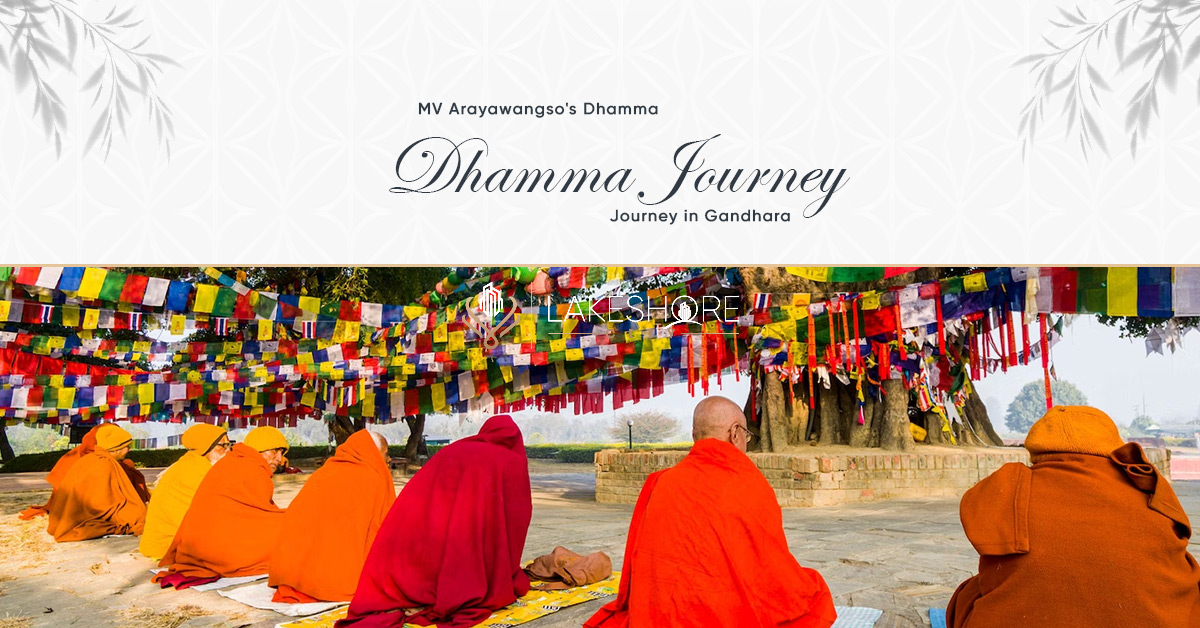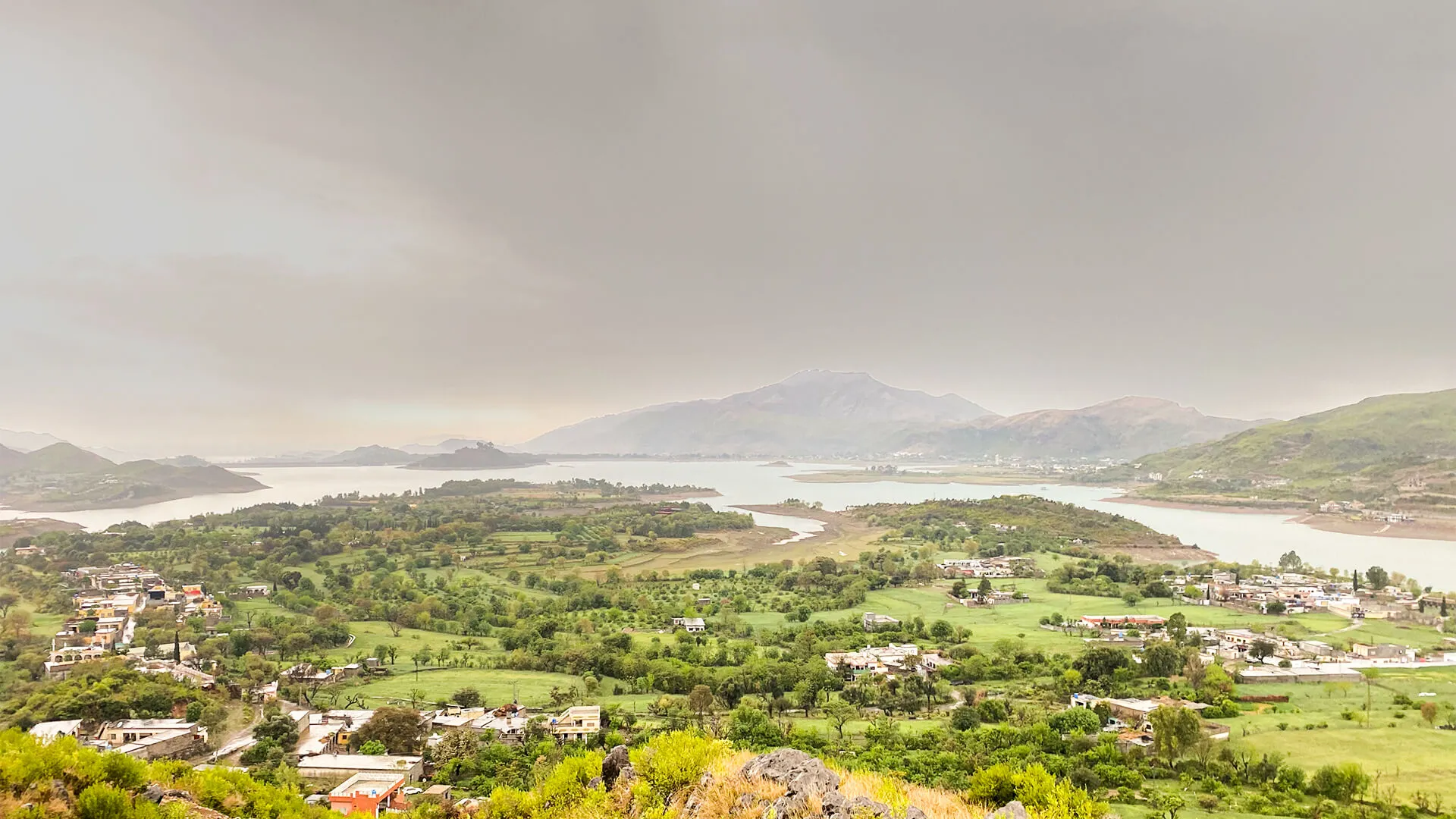Introduction
After four days and three nights, from September 1–4, 2565, BE, MV Arayawangso completed yet another of his numerous religious obligations. The spiritual stream of Gandhara, the civilization that has never left human consciousness, is like the raindrops flowing into the roots of various plants, reviving them to be alive and glad.
It waits there for the one natural leader who will reawaken and bring Gandhara’s spirit back to life once more. The time has come for Gandhara civilization to spring up and shine again, this time amid the sound of the Peace Bell, sending out a signal to awaken every dimension of all beings seeking peace and guiding them to the tranquil state of Nibbana.
Purpose of the Pakistan Rains Retreat
I have received a formal invitation from the Pakistani government to spend my three-month Rains Retreat (during the Buddhist Era of 2565) at Taxila, Punjab State. This is a new chapter in the history of ties between Thailand and Buddhist nations, particularly the Islamic Republic of Pakistan.
I have said numerous times that my travel to spend the Rains Retreat between 11 July and 10 October 2565 BE follows “Dhamma Diplomacy,” organized through diplomatic channels between the Foreign Affairs Ministries of Thailand and Pakistan.
The primary goals of the Pakistan Rains Retreat are:
1. Dhamma study and practice on the territory with immense spiritual worth for humanity as the birthplace of the Indus civilization, the third-most significant culture in the world.
2. Study and practice in Jambudvipa’s northern region, where Buddhism formerly flourished greatly following Lord Buddha’s parinibbana (death), where there are still signs of Buddhist civilization. This was especially true during King Kanishka, the Great of the Kushan Dynasty in Gandhara.
3. My pilgrimage experiences studying and practicing the Dhamma in diverse Buddhist civilizations World Heritage Sites, particularly the Valleys of Taxila, Peshawar, and Swot, as well as participation in other activities, have been documented as analytical notes about the birthplace of Buddhist civilization.
This will be released as a book and circulated worldwide, particularly in the 32 Buddhist nations. The title of the publication is “The Buddhist Civilisation of Gandhara.” The Directorate of Archaeology and Museum in Khyber Pakhtunkhwa will own its copyright, which belongs to the Pakistani government. Everything I vowed to do on the day I left for Taxila to spend Rains Retreat has been done.
I specifically mean the Kathina (robe-offering) ceremony, which dates back a thousand years and is a long-standing custom in Jambudvipa. For this historic ritual, which has brought the Gandhara civilization—a Buddhist World Heritage—again to life, more than 150 individuals are traveling from Thailand.
The Kathina Ceremony will occur on October 12 at the Taxila Museum in Sir John Marshall’s former home, where the Sangha has been holding their Rains Retreat.
My familiarity with this land of civilization has increased due to the Rains Retreat. All Buddhists and the people of Pakistan should be proud of this area for its civilizational value. This value is immeasurable and pertains to every human civilization, particularly Buddhists.
The Tipitaka (The Pali Canon), the biographies of important Buddhist figures, and their associations with locations in the Northern region, such as Gandhara, Maddha, Kamboja, and Kukkuttavadi, provide evidence of Buddhism’s prosperity in this land of civilization, both during and after the time of the Buddha.
This is especially true in the example of King Pukkusatiraj, who became a Buddhist monk after abdicating as the king of Taxila, Gandhara, due to his trust in Buddhism.
King Mahakappina of Kukkuttavadi was also abdicating, a city close to the States of Maddha and Kamboja. The King and his Queen, Anoja devi left the town and took up monastic life with 2,000 supporters.
It should be noted in Pakistani history that Lord Buddha, the World’s Master Teacher, used to spend time in Punjab State at the Banyan Tree on the bank of the Jandhabhaka River, now known as the Jenab River, according to King Mahakappina’s tales found in the Tipitaka.
Therefore, in addition to the learning experience of visiting the Lahore Museum to view the Gandhara Buddhist Arts, the trip to Lahore, Punjab, has a very particular spiritual significance for all Buddhists. My travels to several Buddhist World Heritage Sites have helped me understand the development, preservation, and upkeep efforts made by relevant Pakistani government officials and agencies. An essential topic for discussion is the opening up of these Buddhist cultural heritage sites so that Buddhists all over the world can have the opportunity to express themselves freely and welcome cultural and religious tourism. Regarding the link with local culture, tradition, and religion, this should be done within a reasonable framework and limit.
Studying the historical and archaeological aspects needs to be prioritized. The spiritual significance, which is the genuine goal of Buddhists from other nations, will be supported by this.
In collaboration with people, Buddhist organizations, and nations, festivals and activities should be organized to promote Buddhist civilization as a World Heritage site. The goal is to find a suitable paradigm for encouraging cultural and religious tourism. On October 10, this Rains Retreat will come to a close. The “Devo Alms-Offering” event will occur at King Asokha the Great’s Dhamarajika Stupa in Taxila the next day, on October 11.
The “Devo Alms-Offering” event will be restored for the first time in more than 1000 years on the Islamic Republic of Pakistan’s territory, which is home to the Gandhara civilization and is a World Heritage Site. On that day, participants from Thailand and prominent Pakistani figures will participate in the “Devo Alms-Offering,” which was part of Jambudvipa’s ancient culture during the golden age of Buddhism in Gandhara.
All Thai citizens, including the Sangha, will travel to various Buddhist historical sites in Taxila, Peshawar, and Lahore after the “Devo Alms-Offering” and the “Kathina Ceremony” at the Taxila Museum are over until October 15 when they return to Thailand.
It was beneficial for me to spend three months at the Rains Retreat in Taxila, Gandhara, Pakistan. I get to learn about the culture and traditions of communities and societies in different parts of Pakistan, observe the remains of the Gandhara civilization, and study and practice Dhamma in historic Buddhist locations. It is a genuinely worthwhile experience that fosters accurate comprehension and positive relationships with Pakistani citizens that resemble those of friends or family.
To develop “Cultural-Religious Tourism in the Civilisation World Heritage Sites in Pakistan,” I have consequently drawn out the work plan. Every year, during the first week of November, a significant event will be held with the theme “Tourism Week to explore Gandhara Civilisation, Buddhist World Heritage in the Islamic Republic of Pakistan.” The first day will serve as a reminder of the Peshawar “Ringing of the Peace Bell.”
In any case, this work plan will be further discussed with all parties involved to ensure that it is ideal and advantageous, which is our goal.
Metta blessing, please. Translated into English: Dr. Pawadee Tonguthai
Documentation and Upcoming Publication
After raising their respective flags, Mr. Imran Shauket and Thai adherents of the Most Venerable have united in singing the national anthems of Pakistan and Thailand. The Most Venerable Arayawangso then delivered the following dhamma lecture.
The dhamma is the noble truth that the Lord Buddha had elucidated. Katannu, which means “gratitude,” is one of Buddhism’s most essential dhamma teachings. If you can recognize the benefits of anything you have received or contributed to, you will value it and appreciate it.
Gratitude is a statement of realizing the benefits of the courtesy that has been done. It is a solid foundation for developing steadfast confidence in the virtues present in favoritism’s object or recipient. Buddhism tells us not to throw away tree leaves or branches when we reside in the shade of a tree or under its cover. The lessons apply to societies and nations as a whole.
It implies that when we live on the soil of any country, we will recognize its virtues and appreciate it. This idea is consistent with what Islam teaches. Islam also leads people to enjoy the benefits of their home country. Thus, the ‘katannu’ teaching promotes peaceful existence. Furthermore, none of the teachings of the many religions will cause conflicts or divides between people, societies, or nations. In other words, we might hold varying degrees of faith in various religions. However, we are free to explore and discover. By having katannukatavedita, the quality of gratitude and returning favors, we can unite our diverse hearts and live in harmony. This is comparable to combining many flower varieties to create a lovely bouquet.
Overall, this is about living in harmony and peace. They can coexist in peace and harmony when each respects and appreciates everything they have been given. We are currently residing in the Islamic Republic of Pakistan territory. We owe this place gratitude since it enables us to live, learn, and practice the dhamma. This is made feasible by Pakistan’s government’s generosity and its population’s diversity of religious beliefs. These insights will direct us as we strive to live in fraternity, friendship, and love. Humans ought to treat one another with love. Buddhism defines love as loving-kindness, the kind of kindness that keeps the world alive and keeps things moving. Loving kindness has the power to bind people together.
The statement “Loving-kindness sustains the world” is significant. It conveys the reality that, even though the world constantly changes due to various external circumstances, like the weather, society, and others, the loving kindness we can show one another may keep us in harmony with happiness and tranquility.
Kindness will put an end to all acts of terrorism. All battles will be put to a stop by loving-kindness.
Living in harmony and support of one another is the result of loving-kindness.
Whoever has rice offers rice, and whoever has gasoline offers fuel; everyone is free to trade what they have for what they lack. Historically, cultures, nations, and states were interconnected in this way.
People from Taxila, Gandhara, had been involved in trade and business throughout the Buddha’s lifetime while traveling 200 yojanas to Maghada via Kosala. Yojana was a unit of measurement that represented a length of around 16 km. As a result, multiplying the number of yojana by 16 will give you the distance in km.
Caravans used for trade transported various goods, including ivory and silk, from the Jambudvipa’s northwest region to Maghada, also known as Majjhimadesa, the middle country. About 50 yojanas separated Kosala and Maghada. Therefore, it would take 150 yojanas to get from Gandhara to Kosala. And if we traveled to Sakkka, it would take around 200 yojanas to get there from Kabilvasatu to Gandhara.
This was the goods route on what was eventually known as the Silk Road. China’s mainland must be mentioned while discussing the Silk Way. Chinese sold a lot of silk, particularly that from Xinjiang and other provinces in China, which was highly prized. It was the voyage across the Himalayas from Iran, Bactria in Central Asia, or Asia Minor, Turkistan, to the north of southern Asia. Trading used to take place in Taxila or Gandhara at the connecting point.
Therefore, Gandhara served as the entry point to Jambudpiva and the hub for linking to other areas. It was incredibly successful. There were numerous trade routes leading to Taxila. Regarding this, Taxila was thriving, full of learning, the arts, and science, as well as trade. It must have been quite stunning at Taxila. It is possible to think of Taxila as a prosperous suburb of Jampudvipa with solid ties to northern Buddhism.
While trade grew, the Gandhara region had to deal with war and other international issues. Anyone who wanted to conquer Jampudvipa and take Maghada or Kosala had to cross the Gandhara. As a result, Gandhara has changed over time, from the pre-Buddhist period to the reign of King Alexander, who established an army in Taxila and later expanded it to the Sindhu River, as well as other kings like King Menander, who is well-known to many Thai Buddhists.
I will touch on this quickly so you can understand how this part of Gandhara has developed. You may notice that this land is unremarkable compared to other cities worldwide, such as those in India that were once affluent but have since fallen into decay.
We should learn that vast spiritual values have been accumulated through generations of pain and tears. Each of these values is waiting for me or others to learn about them and to get rid of all the conditioning so they can move forward on the right path, which will become merits dedicating to all spirits in every realm.
My responsibilities begin when I arrive at Taxila, the erstwhile Gandhara that is now part of the Islamic Republic of Pakistan. In addition to my dhamma practice, I have to think about various dhamma phenomena that interact with spirits in every dimension. I would like to convey the findings to the Pakistani government as a gift so they can make them known to the public. I’m thinking about it, but I don’t know how fantastic it will be yet.
Additionally, I will offer the Government of Pakistan advice on how to employ these regions best, so they may thrive economically and socially and, at the same time, global communities can learn about world civilization and pass these values on to future generations. There will only be avenues for more research if we preserve these heritages. That will significantly lose culture, especially in a nation with high spiritual values.
Therefore, our arrival and stay reflect our appreciation and gratitude for the Pakistani government’s and Mr. Imran Shauket’s commitment to the welfare of the Pakistani people.
We are not discussing religion in this context. Religion is only a personal affair; instead, we’re talking about universal spiritual ideals like respect and love for one another. We are close friends who hang around with the righteous. We value and honor these qualities. We’ll all act in a way that leads to good acts.
These characteristics make us good buddies. As stated in the mangala sutta (the discourse of 38 benefits), which starts with Asevana ca balanam, Panditanan ca sevana, meaning not associating with idiots, associating with the wise, good friends in Buddhism are individuals who have morals, who are intelligent, and who are regarded as “pandits.” We should all conduct ourselves like sensible men in this regard.
Today, we pay homage to the flags of Pakistan and Thailand to show our admiration for each nation. We all showed respect to the Islamic Republic of Pakistan while the Pakistani people sang the national song. Following that, we Thais honored our own country, which we had just taken to the Islamic Republic of Pakistan.
The two nations’ flags are flying before the Taxila Museum Guest House. We’ll be determined together: “May I hope for peace between the two nations so everyone can live happily ever after? May there never again be terrorism or natural disasters on these lands.”
Conclusion
We always have positive thoughts wherever we go. We talk correctly wherever we go. Everywhere we go, we behave appropriately. Correctly doing, speaking, and thinking according to the Dhamma will undoubtedly benefit those who carry out good actions and can make the fruit of their deeds into the Dhamma’s power to help all lands we travel.
Humans, non-humans, devas, and all other living things will all love those who think correctly, talk right, and behave right. They will be safe no matter where they are. The Buddha asserts that people who practice the dhamma will be protected.
This is the statement that MV Arayawangso and his supporters have sent to the entire Pakistani population at the invitation of the Pakistani government.
Questions and Answers
Q1.What is the primary purpose of MV Arayawangso’s visit to Pakistan?
Ans. The primary purpose is to spend the Rains Retreat in Gandhara for Dhamma study and practice and to document experiences related to Buddhist civilization.
Q2. What is the significance of the forthcoming publication, “The Buddhist Civilisation of Gandhara”?
Ans. The publication aims to share insights and knowledge about Gandhara’s Buddhist civilization with the world, especially Buddhists in 32 nations.
Q3. How does MV Arayawangso emphasize the importance of gratitude in his teachings?
Ans. He highlights the concept of “katannu,” or gratitude, as a foundational Dhamma teaching, emphasizing its role in fostering peace and harmony.
Q4. Why is the historical context of trade routes, including the Silk Road, relevant to this discussion?
Ans. It helps to understand Gandhara’s historical significance as a trade hub and its role in cultural exchange.
Q5. What are MV Arayawangso’s plans for promoting cultural-religious tourism in Pakistan?
Ans. He proposes an annual event exploring Gandhara’s cultural heritage, fostering community cooperation, and promoting tourism.
Q6. What message is conveyed to the Pakistani government and people in this speech?
Ans. The message emphasizes gratitude for the hospitality and support of the Pakistani government and promotes peaceful coexistence and harmony among diverse religious beliefs.
Our Featured Article:
Read More: Buddhism in Northern Jambudvipa and Archaeological Discoveries
Don’t miss the chance to invest with Lakeshore! Secure your investment today by investing your financial investment with Lakeshore in the following available options like Lakeshore City, Lakeshore Club, and Lakeshore Farms.
For More updates, please Contact +92 335 7775253 or visit our website https://lakeshorecity.com/
Lakeshore City is the upcoming elite lifestyle at Khanpur Dam. Offering no parallel amenities for the members and owners of distinguished farmhouses.
Become Part of Luxurious Lifestyle
Contact: 0335 7775253



